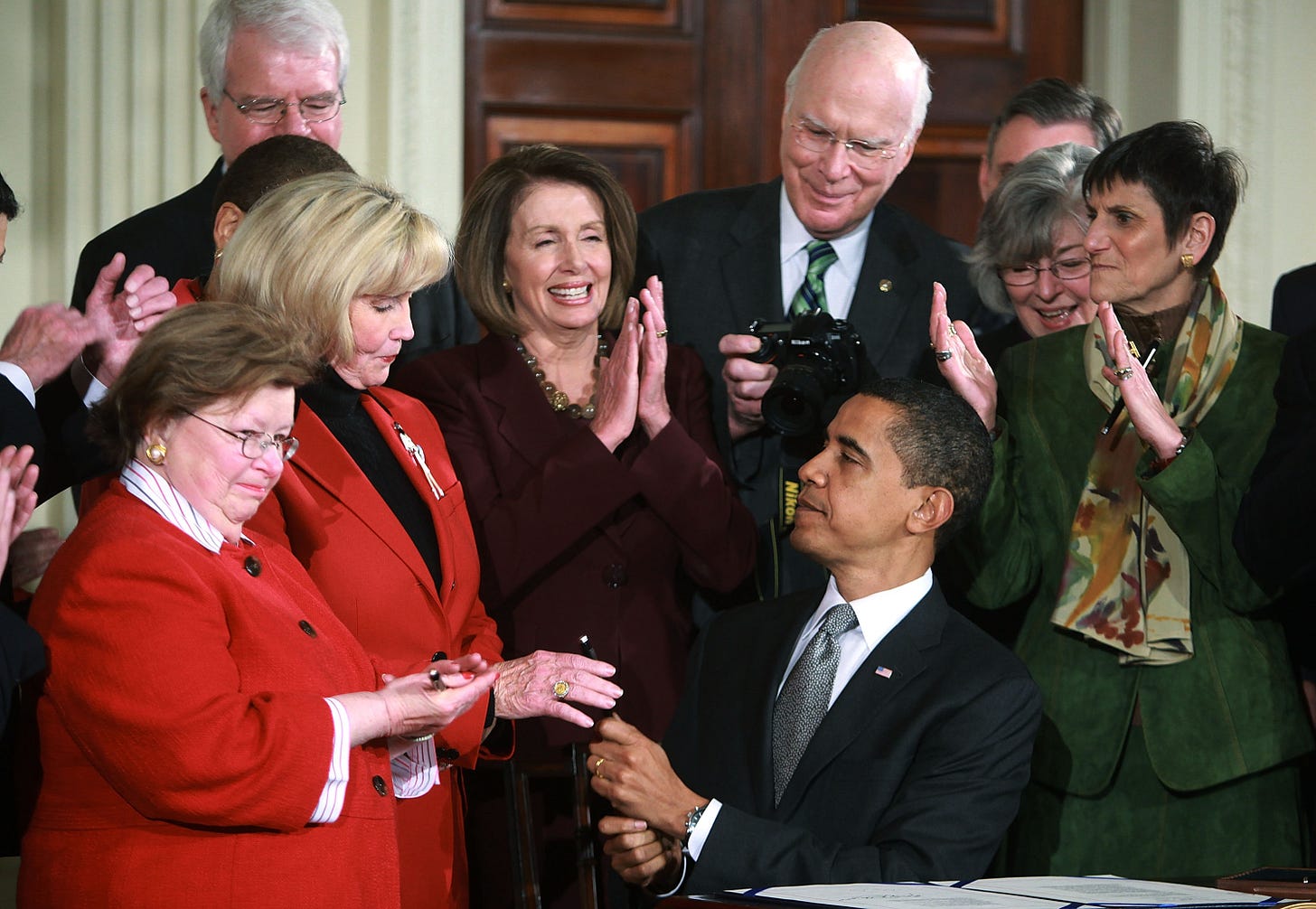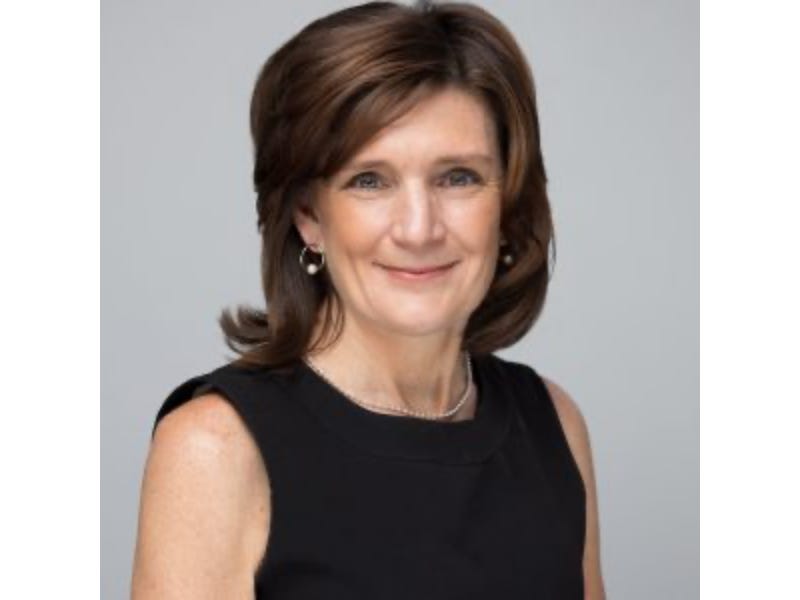Q n A: Business leader Gwen Young on 'LILLY' and the state of the pay gap
The CEO of the Women Business Collaborative weighs in on advances since Lilly Ledbetter Fair Pay Act was signed in 2009

Support independent journalism, a free subscription gets you most 24sight gems, but paid supporters get full access, including the Substack Live Recordings over at the Super Secret Members Page. $5/month, $50/year
The movie documenting Lilly Ledbetter’s long fight for improved pay equity, “LILLY”, launched on video on demand today. I spoke recently with Gwen Young, CEO of the Women Business Collaborative, who has worked intensively on closing the pay gap between men and women. (As Young notes, women on average still earn 83 cents for every dollar a man earns in the same job. Better than in years past, but still a good bit away from equity.)
I remember when Obama signed his first piece of legislation in office, the “Lilly Ledbetter Fair Pay Act”, just days after taking office in 2009, in the midst of the continued financial crisis and The Great Recession, a sharp indication of the measure’s importance to the newly inaugurated president. The movie “LILLY”, documenting Ledbetter’s sustained battle with Goodyear Tire, launched roughly 16 years later.
What follows is a my Q n A with Young, edited for space and clarity.
Tom LoBianco: Tell me a bit about your background with Lilly Ledbetter, the Ledbetter Fair Pay Act and the movie that just came out.
Gwen Young: Women Business Collaborative’s mission is equal position, pay and power for all women in business, so pay equity is a part of everything that we do. We gave Lilly Ledbetter a Trailblazer Award in 2021 celebrating her achievements in getting the 2009 Lily Ledbetter Fair Pay Act accomplished, but also the legacy she left in being an advocate in working with other organizations, including her fight up to the Supreme Court.
And we had Rachel Feldman, who is the director, writer, director, and one of the producers of the film interview Lilly in 2021. So as the film came out we screened the film in both Silver Spring and at the Motion Picture Association here in Washington, DC. We had a lunch on June 3 with Rachel Feldman, two of the producers, to talk about the film and the achievements Lilly has in creating a way for not only pay equity and pay parity, but also being an activist and author, and allowing everybody to be active and advocate for equal treatment in the workplace.
TL: What is the what's the current status of pay equity? On average, do we have a sense of where women's pay for the same or comparable jobs are with men in the workforce?
GY: Women are still 83 cents on the dollar. So we've made progress. Black women earn about 67 cents. And Latina women, I think it's 57 cents on the dollar right now. White women earn the most vis a vis men, a little closer to 87 cents on the dollar. So we're not doing that great. We're not at equal pay at this point. I believe in 2009 we were at about 78 cents on the dollar. Okay, so we're up to about 83 cents on the dollar. So think about how long that has taken.
TL: Refresh me on the Ledbetter Act. What did the the Ledbetter act do, specifically? And I assume, or I hope that the wage gap, the pay gap has improved since 2009.
GY: So Lilly, when she argued for equal pay, it took her about eight years, and it went up to the Supreme Court. The Supreme Court said that she could not get backpay and be compensated because she did not file a claim within 180 days of a paycheck, and up until 2009 it had to be from your first paycheck.
So if you didn't know within 180 days of your first paycheck that you were discriminated against. So let's say you found out a year later, which has happened a lot, even in the government, you couldn't file a suit. So in 2009, the Lilly Ledbetter Fair Pay Act said the clock on those 180 days starts every time you get a paycheck. So they don't expect to know in the first two or three months whether you're getting equal pay. It takes time to figure that out, because, as you know, in the U.S., we don't have to talk about how much we get paid.
TL: Has it been successful in the courts since then? Has it been used effectively?
GY: It has been used effectively. But again, because it's not the only thing that impacts whether you get paid equally. The Ledbetter brought suit, by the time she got to the Supreme Court, it's 2007, that’s eight years of cost, time and energy, right? So while the Ledbetter Act got put in place and promoted, but what's most important is that the awareness of that, the fact that the act was in case, fueled state laws. So you're creating a state remedy, and companies have become more aware. What it measured was what companies put on their website, what they made public of their data, how many of their employees are men? Is there pay equity? And we found that close to 20% of companies were conducting pay audits, meaning they were saying, aren't we paying our men and women equally? They were conducting those pay audits, and 18% of them were telling their employees the results of those audits. So you've probably got eight states that have equal pay laws. So there's not that many states that have equal pay laws, but the companies themselves are starting to promote this. So 14 states they have paid transparency legislation, which means you need to make your pay transparent. And the reason that's important that allows you or I to figure out if we're being underpaid, (you wouldn't argue if you were being overpaid, right?)
TL: So much of this is dealing in the reality of what we're going through in this country right now. Has any of this changed since then, whatever the backlash is that you, you know, you want to call coming out of the White House and some companies have certainly changed their tune on a number of issues, certainly dealing with equity and social justice.
GY: In some ways, is a little too early to tell if you're trying to talk about 2025.Since 2009 the number of companies that conducted pay audits, that talked to their employees about pay equity, that made a commitment to pay equity and said publicly for equity, went up. And I think, you know, one of the most vocal companies was Salesforce. So in 2015, they did a company-wide pay audit. They spent a lot of money doing the work, but after the audit, they spent about 3 million to close the pay gaps.
So not only the audit, but they closed the gap. So they paid money out. And they continued to have the audits, you know, regularly, and, and they made a real, huge commitment. I think the number that Salesforce said that they spent between, like they started all this in 2015 but broadly, they spent $22 million to the public number to say, okay, Perry, and they were public about that, right? So, so, you know, they kind of, they sort of started the, they're not the only one, but they started the sort of being public about it, putting it on websites. We did the snapshot at the end of 2023, almost 20% of the Fortune 500 companies signed up. Versus zero, 20 years ago, that’s huge.
There's other company's doing well right now, like American Express, Adobe, Citi, General Motors, there are some of the others. Costco and Apple, Delta is doing well. Cisco's done quite well. A lot of companies right now are continuing either pay equity or they're committed to women's leadership, and they're not talking about it. So language from diversity and inclusion to belonging, they kind of changed it around, but the commitment is still there, under the radar. And so I think we're going to see, in the next few months, what comes out of it.
Up this week
Look for the latest installment in the special series “Trygve’s Seven Rules for Fighting Autocrats” — Rule 4: Authoritarians must live in a truth-free present — tomorrow from myself, Reed Galen and Trygve Olson.
Then look for a Substack Live later this week with with Brandon Jarvis for an update on the Virginia elections (the primaries wrap in just a week!)
Juliegrace Brufke is on a much-deserved vacation this week, look for more from the Hill next week.
In case you missed me with Chris Cuomo, recommend the watch here. We go deep on the requirements and need for professional journalism in this moment.
Friends, I’ve got a special favor to ask: Help me build the 24sight community by checking out our social media accounts. I post shorts of great interviews like this one, occasional updates and more.
Please sign up, follow, subscribe, share, comment. Support the mission of real journalism, accountability, speaking truth to power.
YouTube
Bluesky
TikTok
X (only when necessary)
And right here on the OG, Substack
News that gets through to DC, VA, PA Powerbrokers
Sponsors of 24sight News get in front of our highly engaged audience of decisionmakers, professionals, thought leaders, national media and more. Top readers span the nation, including heavy engagement throughout Northern Virginia, the suburbs of Philly and Pittsburgh and around Capitol Hill.
Get in touch to discuss sponsorship options: sales@24sight.news.




If women are upset about pay, they should take their gripes up with their sisters in Human Resources. That’s right ladies if you’re not getting paid what you think you deserve then another woman is likely responsible for that disparity. Compensation falls under the HR umbrella and HR is 90% female and of that number probably 95% white female. Yet another reason why HR are a bunch of hypocrites and so despised.
Fabulous piece and the lunch at i Ricchi was also. Great fun and interesting.